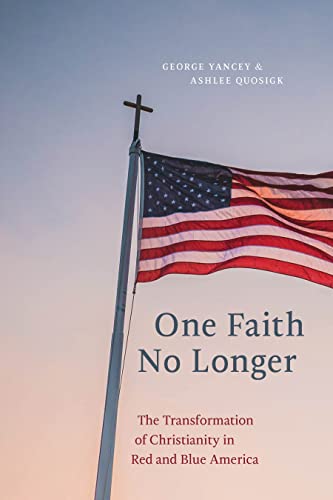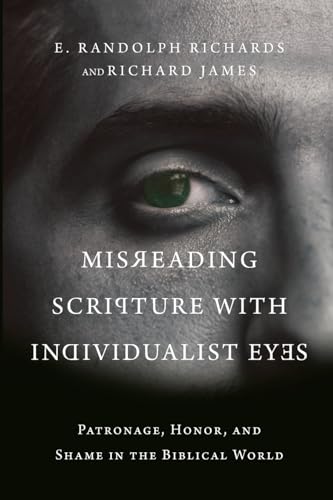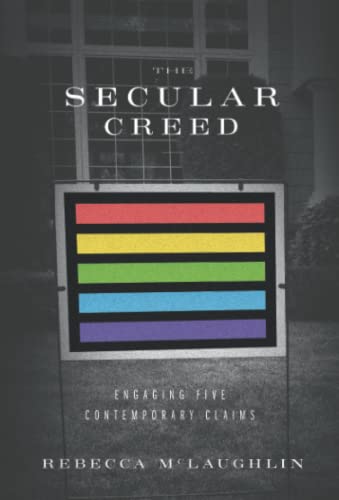One Faith No Longer: The Transformation of Christianity in Red and Blue America
Written by George Yancey and Ashlee Quosigk Reviewed By Bruce Riley AshfordWhat hath Christian progressivism to do with Christian conservatism? Little to nothing, the authors of a new study argue. In One Faith No Longer: The Transformation of Christianity in Red and Blue America, sociologists George Yancey and Ashlee Quosigk contend that the differences between these two groups are so significant that it is time to regard them as distinct species rather than different breeds.
In the introductory chapter, the authors summarize well the book’s conclusions:
We highlight here that progressive Christians emphasize political values relating to social justice issues as they determine who is part of their in-group; they tend to be less concerned about theological agreement. Conservative Christians, however, do not put strong emphasis on political agreement in order to determine if you are one of them—their major concern is whether you agree with them theologically. The bottom line we seek to illuminate in this book is that progressive and conservative Christians use entirely different factors in determining their social identity and moral values. Indeed, we argue that the ways in which these two groups deal with questions of meaning are so different that it is time to regard them as distinct religious groups rather than as subgroups under a single religious umbrella. (p. 4)
The criteria for their determination are two-fold: religiously, distinct groups use contraposed moral frameworks as well as contrasting methods for determining who possesses “in-group” versus “out-group” status. According to the authors, only recently have left-leaning and right-leaning ethical frameworks become so radically disparate, and thus only in recent times have progressive-conservative “insider” and “outsider” statuses become incommensurable.
The first chapter of the book traces the history of the modernist-fundamentalist controversy, demonstrating that progressive Christianity uniformly traces its religious lineage back to the Social Gospel and similarly liberal reform movements. As a result, progressive Christians have undergone a seismic soteriological shift, leaving behind the historic Christian emphasis on personal justification and sanctification and embracing instead agendas for social transformation. The second chapter contains the backbone of the authors’ statistical analysis, while the remaining chapters illustrate and nuance those findings with expositions of interviews conducted by the authors.
As a work of scholarly sociology, the authors set forth a convincing case: progressive Christianity and conservative Christianity are not “brothers from a different mother” but are intractably in opposition to one another. Some details of their argument are counterintuitive and perhaps inaccurate. For example, the authors argue that conservative Christians are more willing to challenge the Republican platform than progressives are to challenge the Democratic platform. Although some conservatives have demonstrated willingness to challenge Republican presidents and leaders and some progressives dispute Democratic orthodoxy, on the whole, the majority of thought leaders and publicly-minded pastors seem unwilling or unable to critique their respective political parties. However, quibbles aside, the authors successfully argue their thesis.
What remains, and what is outside of the scope of their sociological study, is to explore the philosophical and theological underpinnings of the respective camps. A fertile area of theological research would be to explore the work of liberalism’s forefather, Friedrich Schleiermacher, comparing and contrasting his theological and ethical convictions with contemporary progressives. In particular, historians might explore Schleiermacher’s thesis that Christian doctrine and ethics are properly formulated by disciplined reflection upon the Christian community’s shared experience. It seems that modern progressives also formulate doctrine based upon experience but also upon another theological source—modern culture.
Philosophically, a fertile line of research would be an exploration of Charles Taylor’s exposition of secularism in relation to Christian progressivism and conservatism. Taylor argues that Westerners—conservative and progressive alike—tend to live their lives within the “immanent frame,’ that is, they tend to manage their lives without significant reference to God. With relative ease, one could demonstrate progressive Christianity’s doctrinal and ethical program is carried out almost entirely within the immanent frame. Similarly, Taylor explores the “extraordinary moral inarticulacy” of our secular age; the contemporary era’s jettisoning of any transcendent frame of reference leaves us unable to draw upon a shared point of reference in which we could argue “toward truth,” instead enabling us merely to disagree with one another from our own tribal points of view. Such a jettisoning seems to be exactly what many progressive Christians have undertaken.
Conversely, with careful attention one might also find that some conservative Christians—despite their explicit appeals to God, to special revelation, and to a transcendent moral framework—depend so heavily on human resources such as political activism that their eschatology is at least partly immanentized. One suspects that a thorough investigation of contemporary conservative Christianity will reveal that some conservative Christian leaders lapse into a utilitarian ethic when justifying actions undertaken in the political realm or providing warrant for certain conclusions in the realm of foreign policy.
One Faith No Longer is a significant contribution to the burgeoning industry of American socio-religious analysis. Its sociological method is impeccable, its conclusions warranted, and its writing lucid. What remains is for theologians and philosophers to draw conclusions about the roots and fruits of these two very different species of American religion.
Bruce Riley Ashford
Bruce Ashford is provost and professor of theology and culture at Southeastern Baptist Theological Seminary in Wake Forest, North Carolina.
Other Articles in this Issue
In the book of Kings, Elisha is the Spirit-empowered man of God who walks with God, represents God, and shows the way to covenant faithfulness through word and deed...
Baptists provide an excellent window into the American identity during the antebellum period...
This article explores Colossians, a letter in which Paul says a considerable amount about work...
This article offers a reading of Nicholas Wolterstorff’s objections to the doctrine of divine simplicity, which has seen a kind of rebirth amongst both Catholic and Protestant theologians in recent decades...
The Targums were not translations for the Aramaic-speaking masses who were ignorant of Hebrew...






